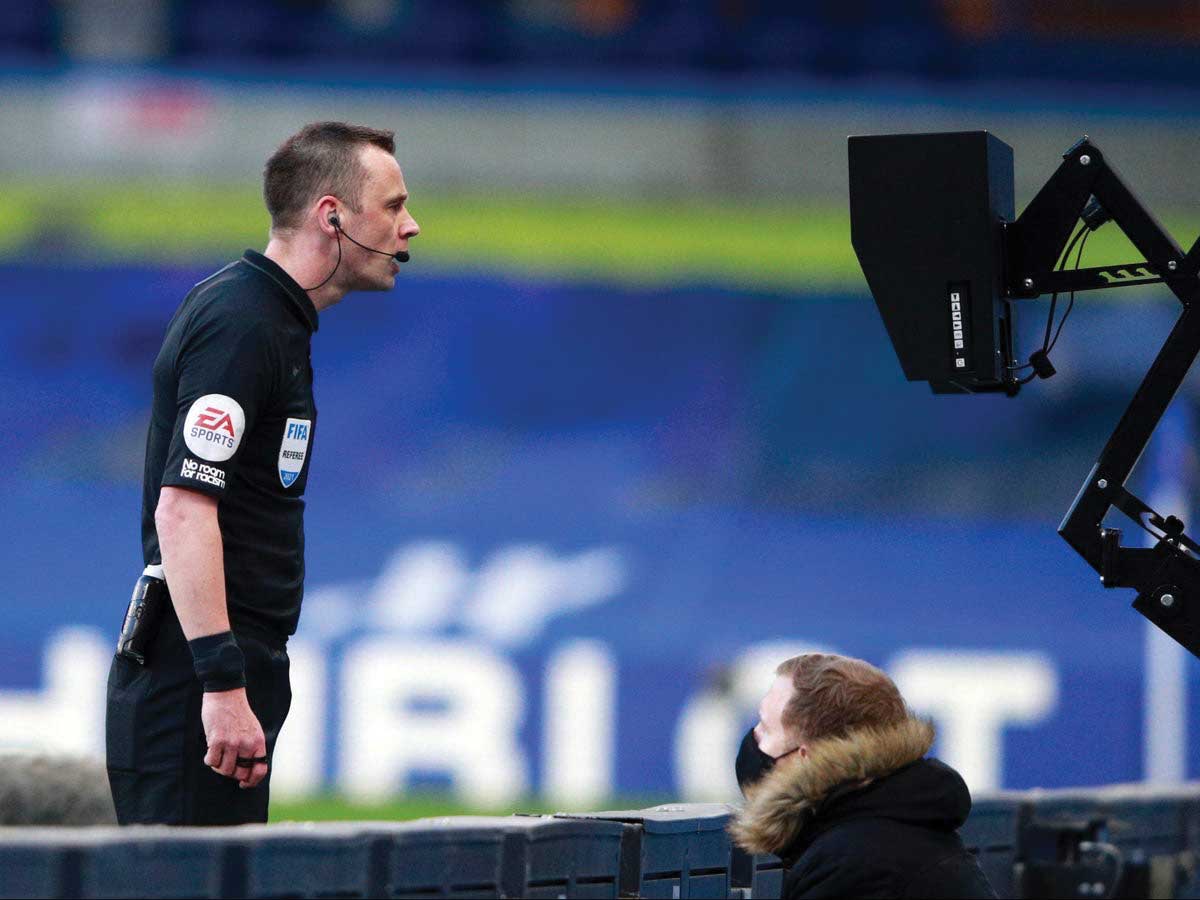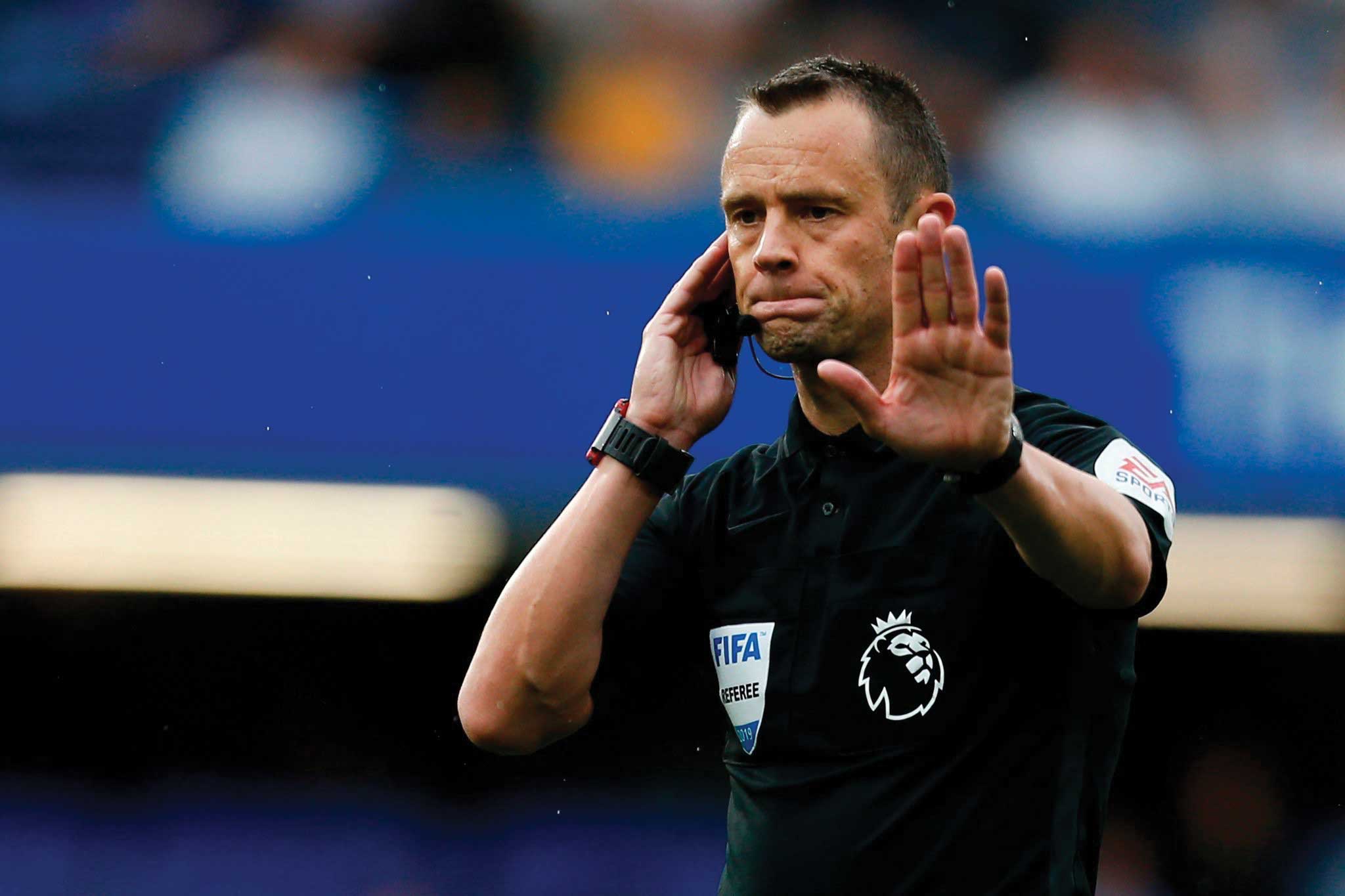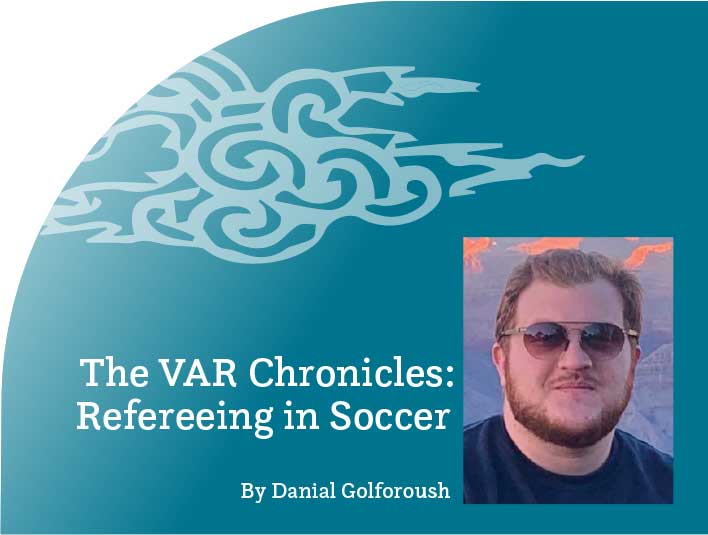The VAR Chronicles:
Drama, Controversy, and the Quest for Perfection in the Premier League
By Danial Golforoush
 The English Premier League, a footballing juggernaut renowned for its heart-pounding matches and world-class talent, has been a theater of drama for generations. But in recent years, a new character has taken center stage, one that has fans and players alike alternately applauding and tearing their hair out. This character is none other than the Video Assistant Referee, or VAR.
The English Premier League, a footballing juggernaut renowned for its heart-pounding matches and world-class talent, has been a theater of drama for generations. But in recent years, a new character has taken center stage, one that has fans and players alike alternately applauding and tearing their hair out. This character is none other than the Video Assistant Referee, or VAR.
Since its debut in the Premier League in 2019, VAR promised to bring pinpoint precision and fairness to the beautiful game. However, like any blockbuster production, it has had its fair share of plot twists and controversies. In this in-depth analysis, we embark on a journey through the VAR era, exploring its introduction, its impact on matches, and the passionate debates it has ignited. We also examine specific incidents that have left the footballing world in shock and awe and discuss the potential future of VAR in the Premier League.
The 2022/23 Season: Tottenham vs. Liverpool—A Rollercoaster Ride
Picture this: a Premier League showdown between Tottenham Hotspur and Liverpool in the 2022/23 season. Two red cards, three goals, including a jaw-dropping 96th-minute own goal, sensational goalkeeping, and a tactical battle that could rival any Hollywood blockbuster. Yet, amid this spectacle, it was a single moment in the first half that stole the headlines.
Liverpool’s Curtis Jones had just seen red for a reckless tackle on Spurs’ Yves Bissouma, reducing the Reds to ten men. But then, a glimmer of hope emerged that could rewrite the narrative of the match. A lightning-quick throw-in set up Mohamed Salah to deliver a laser-guided pass from the right wing into the heart of the Tottenham defense. In a flash, Luis Diaz, donning Liverpool’s colors, showcased his wizardry, slipping through the defensive ranks and calmly depositing the ball into the back of the net. The crowd erupted and Liverpool’s bench seemed to levitate with joy. But joy can be fleeting.
As swiftly as the celebration had erupted, it was extinguished. The sideline referee hoisted the flag, signaling an offside. The goal, initially celebrated with fervor, was wiped off the scoreboard. The match ground to a momentary halt as the VAR team, tucked away in their video review chamber, embarked on their mission. Familiar scenes of lines criss crossing screens played out, and the footballing world held its collective breath.
To the naked eye, Luis Diaz had appeared to be comfortably onside, yet the decision hung in the balance. The match resumed, but even the unflappable commentators couldn’t help but question their own eyesight. “Am I seeing things there?” exclaimed one commentator in disbelief.
Less than two minutes later, a sudden turnover of possession handed Tottenham’s Son Heung-min the opportunity of a lifetime. Seizing the moment with both hands, Son capitalized on a pass following an astonishing run by Brazilian sensation Richarlison, slotting the ball into the net. The scoreline had flipped dramatically in Tottenham’s favor.
Liverpool would ultimately succumb to a 2-1 defeat, finishing the match with just nine players after an agonizing own goal by their defender, Joel Matip. While we can never say for sure if Son would have found the net had Luis Diaz’s earlier effort not been ruled out, it undoubtedly shifted the game’s dynamics. Liverpool, already grappling with a numerical disadvantage, now had to chase the game with even greater urgency. The stakes in this match were astronomical, with both teams nurturing dreams of clinching the Premier League title. This game’s outcome held far more weight than your run-of-the-mill league fixture.

Liverpool and Jurgen Klopp’s Emotion-Fueled Verdict
Liverpool’s gaffer, Jurgen Klopp, is not known for holding back his emotions. After the game, his frustration and disappointment were palpable. He wasted no time addressing the controversial offside decision. “I don’t think there is anything to say about the offside goal – I knew about it at half-time. In the first moment, I thought it was clearly onside, but you think they have a better view. I am pretty sure whoever made the decision didn’t do it on purpose. It didn’t take extremely long to come to the conclusion. That’s a bit strange, but someone else has to explain.”
Klopp’s ire extended beyond the disallowed goal. He turned his gaze toward the VAR system itself. In his post-match assessment, Klopp pondered how VAR influenced the ebb and flow of matches. He acknowledged that while perfection might remain an elusive goal, VAR was initially introduced to enhance the accuracy and quality of decision-making within the sport. Klopp’s candid assessment struck a chord with fans and pundits who had witnessed VAR-related dramas unfolding in the Premier League.
PGMOL’s Mea Culpa
Shortly after the final whistle, the Professional Game Match Officials Limited (PGMOL), the organization responsible for match officials in English professional football, came forward with a stunning admission—a “significant human error” had occurred. They openly conceded that VAR should have stepped in and the goal should have stood. However, VAR remained silent, resulting in an erroneous decision. The prescribed protocol had been followed to the letter—the lines were drawn, the procedure meticulously executed—yet instead of recommending an intervention and awarding the goal, the officials in the VAR room signaled a “check complete.” Later, Liverpool FC issued an official statement, saying, “We fully accept the pressures that match officials work under but these pressures are supposed to be alleviated, not exacerbated, by the existence and implementation of VAR.
It is therefore unsatisfactory that sufficient time was not afforded to allow the correct decision to be made and that there was no subsequent intervention. That such failings have already been categorised as ‘significant human error’ is also unacceptable.
Any and all outcomes should be established only by the review and with full transparency. This is vital for the reliability of future decision making as it applies to all clubs with learnings being used to make improvements to processes in order to ensure this kind of situation cannot occur again.”
Challenges, Controversies, And The Call for Semi-Automatic Offside Technology
VAR made its grand entrance into the Premier League in 2019, armed with the power to review and, if necessary, rectify decisions made during a match through the lens of video footage. However, it’s crucial to recognize that VAR’s jurisdiction is limited to specific scenarios. It can exclusively suggest that the on-field referee reevaluates their decisions in four key situations: determining whether to award a goal, awarding a penalty, addressing cases of mistaken player identity, and assessing incidents leading to a direct red card. It’s also worth noting that VAR does not intercede in matters involving second yellow card offenses.
While VAR and new technologies have undoubtedly made the game fairer and better-refereed, they haven’t ushered in an era of infallibility. After all, the process still relies on multiple humans. However, VAR has been generally successful, with the English Premier League confirming that during the 2019/2020 season (when VAR made its EPL debut), the accuracy of key match decisions soared from 82% in the previous season to an impressive 94%. Nevertheless, doubts about VAR’s effectiveness in the Premier League continue to fester, and it’s becoming increasingly evident that there are growing concerns. Incidents like the one involving Luis Diaz, where clear errors were not rectified in specific situations, have intensified scrutiny of the VAR system. While efforts are underway to enhance the accountability of match officials, maintaining the system’s integrity remains a challenge.
As the dust settles on each VAR controversy, football aficionados ponder the path forward. In a significant decision, Premier League clubs chose not to implement semi-automatic offside technology ahead of the 2023/24 season. However, the recent incident has reignited discussions and is likely to prompt calls for the Premier League to consider adopting the system that was successfully utilized during the 2022 World Cup.
This cutting-edge technology, closely monitored within the English top flight, especially following its integration into the Champions League, offers numerous advantages. The primary allure of a semi-automated system is its ability to eradicate the need for manual line drawing or activation. Instead, it operates seamlessly by automatically generating a virtual offside line. Moreover, it can accurately pinpoint essential anatomical reference points on multiple players simultaneously, including their head, toes, upper arms, and knees. In addition, it employs ball-tracking technology to precisely determine the ball’s position at the moment it is kicked. All this information is rapidly transmitted to the VAR official through a real-time alert system driven by artificial intelligence.
While technology does the heavy lifting, the VAR’s role remains vital. The VAR is responsible for validating the proposed decision and subsequently conveying the information to the on-field referee. This explains why it is referred to as a ‘semi-automated’ system, as it eliminates the need for manual line-drawing or activation when reviewing video clips or still images of match incidents.
Football’s Quest for Balance
The VAR era has ushered in a new chapter of footballing history in the Premier League. It has brought advancements in decision-making accuracy while also introducing a fresh set of challenges. The debates surrounding its impact on the flow and dynamics of matches continue to rage. As the Premier League grapples with VAR-related controversies, the search for the perfect balance between technology and tradition endures.
The Premier League has always been known for its adaptability, and once again, it finds itself at the forefront of football’s evolution. While VAR has added layers of complexity to the beautiful game, it has not diminished its capacity to captivate and astonish. In the end, the drama, the controversies, and the pursuit of perfection all contribute to the rich tapestry of the Premier League, ensuring that its story remains as compelling as ever.











